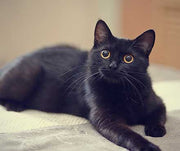Why Do Cats Get Feisty?

It can be a fine line between play and aggression when your cat turns feisty. Feistiness can be the indicator that something in your cat's mood is changing. One moment, your cat can be lying on the soft contentedly; the next he's swatting and biting at the hand you've just tried to pet him with. A cat's sudden turn toward aggression can be surprising and frustrating, especially if he manages to bite or scratch you. But these are normal cat behaviors. Below is a look at why cats suddenly turn feisty and what you can do about it.
Petting
Petting your cat tranquilly is one of the great pleasures of pet ownership. But as you pet your cat, you are putting a certain kind of energy into him, one that transforms his mood. Signs that your cat is turning feisty include a twitching tail, ears pulled back, and their head following your hand movements.

If you choose to continue with this behavior, the cat might become aggressive, ultimately trying to bite your hand and snatch it with his claws. To avoid having your hand pulled into the cat's body, it's important to discontinue the behavior. This means avoiding eye contact with the cat, stopping hand movements, and getting up and moving away from the cat, so that he has time to cool off. You can try offering some treats as well.
As a rule to avoid the aggression just described, you should try and stick to petting mainly your cat's head, as petting him on the body could lead to feisty behaviors.
Fear

Cats are also prey in the wild, so it could be that their feistiness comes from feeling defensive. If you are too aggressive with your cat, you might stimulate his defenses. If he feel defensive, he will try to make himself look smaller. His ears might flatten, and he might hiss or swat at you. In this case, he might attack you or your hand out of a feeling of insecurity or anxiety about a situation you might not fully understand. For example, did you pet your cat too roughly or violate his space? Cat's don't always attack because they think your hands are prey. Sometimes, they attack because your hands occupy more of a predatory posture instead.
Because cats are so territorial, they get upset when they can't defend their turf. In some cases, a cat might spot an animal out the window that is upsetting him. Because he can't take his aggression out on the animal outside, the next animal he sees indoors – perhaps another cat – could get the brunt of that pent-up aggression.
Play
Kittens are especially vulnerable to feisty behavior – a turn toward the aggressive – because much of their play mimics and draws from hunting instincts. Cats love to leap at and bat toys or other small objects because they remind them of prey in the wild. The same might go for your bare feet – any small object that moves could arouse your cat's prey drive.
 It's very important that you take the time out of your day or week to interact and play with your cat. Playtime is very important in a cat's life for a number of reasons. First, play time is a time for your cat to exercise and get his or her heart pumping, especially if your cat is an indoor cat. Besides exercise, playtime also keeps cats from getting too bored, which could then lead to destructive behaviors. Second, cats and their owners build stronger bonds through playtime. Interacting with your cat during playtime by making eye contact or making their wand fly through the air shows your cat that you care about and love them. After all, cats are very sensitive creatures, even though they try to hide it. And lastly, play time is a way to engage your cat's natural instincts in order for them to live and happy and fulfilling life. Remember, cats were once wild creatures and have strong hunting instincts. So, in order to engage your cat's natural instincts, first figure out what kind of prey excites them.
It's very important that you take the time out of your day or week to interact and play with your cat. Playtime is very important in a cat's life for a number of reasons. First, play time is a time for your cat to exercise and get his or her heart pumping, especially if your cat is an indoor cat. Besides exercise, playtime also keeps cats from getting too bored, which could then lead to destructive behaviors. Second, cats and their owners build stronger bonds through playtime. Interacting with your cat during playtime by making eye contact or making their wand fly through the air shows your cat that you care about and love them. After all, cats are very sensitive creatures, even though they try to hide it. And lastly, play time is a way to engage your cat's natural instincts in order for them to live and happy and fulfilling life. Remember, cats were once wild creatures and have strong hunting instincts. So, in order to engage your cat's natural instincts, first figure out what kind of prey excites them.Do birds, butterflies, and other creatures that fly excite your cat? If so, your cat is attracted to Air Prey. When looking for toys to engage your cat's air prey drive, look for cat wands with feathers, toys that hang from door knobs, or cat toys that hand down in the air, like JW's Cataction Spring String Cat Toy.
When a bug skitters across the floor, does your cat take notice? If so, your cat enjoys hunting Ground Prey. When looking for toys to engage your cat's ground prey drive, look for cat wands with toys at the end that can be skittered across the floor, like JW's Zippy Mouse Cat Toy. Also look for mice-shaped cat toys or lightweight balls that are designed to rolls across floors.
Conclusion
Overall, there are a number of reasons cat's get feisty. Usually, it's not anything you need to worry about. Sometimes, cats just need to release pent up energy and running around the house like a crazy cat is just what is needed.
Previous article

Next article

Related posts
View all-

How to Keep Your Pet Calm During Thanksgiving
Thanksgiving is a time for family, friends, and food, but for our pets, the holiday can be overwhelming. The sudden change in routine, unfamiliar faces and scents, and increased noise can trigger significant stress. Understanding why your pet might feel anxious is the first step toward creating a peaceful holiday experience for everyone, including your furry family members. This guide offers calming tips for pets and practical solutions to ensure your dog or cat feels safe and secure during the festivities.
Read Article -

Top Travel Essentials for Pets This Holiday Season
Holiday travel often means bringing the whole family along, and for many of us, that includes our furry companions. Preparing for holiday pet travel is about more than just packing a bag; it's about ensuring your pet's safety, comfort, and happiness from the moment you leave home until you return. A little planning helps reduce stress for both you and your pet, making the journey a positive experience for everyone involved.
Read Article -

Best Leashes and Collars for Daily Walks: A Pet Parent’s Guide
A daily walk with your dog isn't just a chore—it's a chance to bond, explore, and stay active together. The right leash and collar can make every walk safer and more enjoyable for both of you. With numerous styles and materials available, it's essential to find gear that suits your dog's needs and your lifestyle.
Read Article



